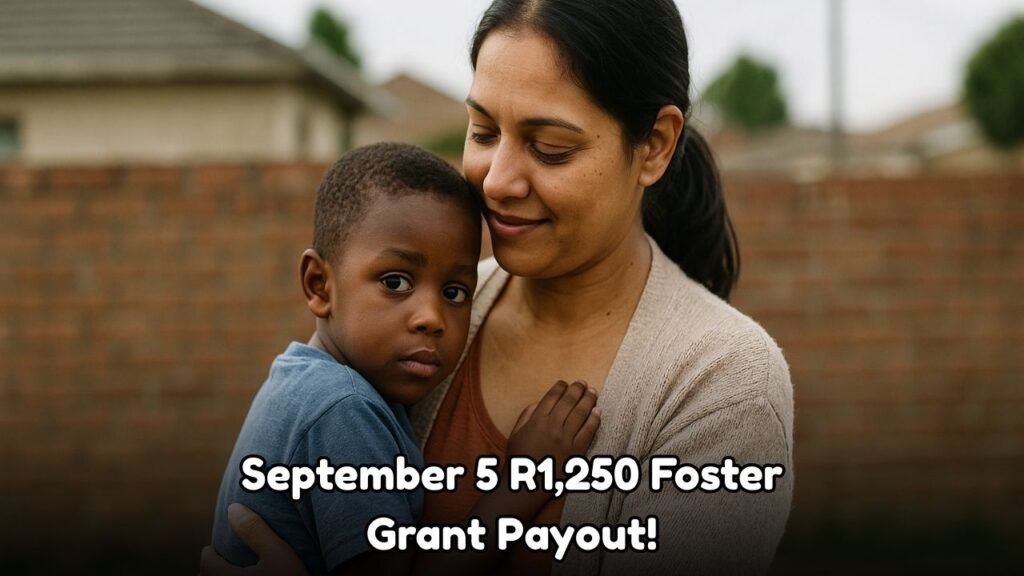Eligibility for the R1,250 Foster Child Grant: Understanding who qualifies for the R1,250 Foster Child Grant, which will be available from September 5, is essential for caregivers across South Africa. This grant aims to support those who provide care for children in need, ensuring they have the resources necessary for a stable upbringing. As the date approaches, many are eager to determine whether they meet the eligibility criteria and how they can access these funds. The grant is part of a broader initiative by the government to alleviate financial strain on foster families and ensure that every child has a chance to thrive in a nurturing environment.

Who Qualifies for the R1,250 Foster Child Grant?
To qualify for the R1,250 Foster Child Grant, caregivers must meet specific criteria set by the Department of Social Development. This initiative is designed to provide financial assistance to those who have taken on the responsibility of caring for a child who is not their biological offspring. Typically, eligibility is restricted to individuals who have been legally mandated by the courts to provide foster care. This legal requirement ensures that the grant reaches those who are officially recognized as caregivers, providing them with the necessary support to manage the additional expenses of raising a child.
Moreover, the child’s residency status in South Africa is a crucial factor. Both the foster parent and the child must be South African citizens, permanent residents, or refugees to qualify for the grant. This stipulation ensures that the program supports those within the national welfare system. Additionally, foster parents must provide proof of the child’s foster status, usually in the form of a court order, as part of their application. The government’s focus is on ensuring that the funds are appropriately allocated to families genuinely in need, thereby fostering a conducive environment for child development.
How to Apply for the R1,250 Foster Child Grant
Applying for the R1,250 Foster Child Grant is a structured process that ensures fairness and transparency. Prospective applicants need to visit their nearest South African Social Security Agency (SASSA) office to begin the application process. It is important to bring along essential documents, including the child’s birth certificate, the court order for foster care, and identification documents for both the caregiver and the child. These documents are necessary to verify the applicant’s eligibility and to process the grant efficiently.
Once at the SASSA office, applicants will be required to fill out a form that details their personal information and the child’s particulars. The process is designed to be straightforward, but it is always advisable to double-check all entries to avoid any delays. After submission, the application undergoes a review process to confirm the eligibility. This review is crucial as it ensures that only those who meet all criteria receive the grant, maintaining the integrity of the program.
The waiting period for approval can vary, but SASSA aims to process applications as swiftly as possible to ensure that eligible families receive timely support. Once approved, caregivers will receive the grant monthly, providing much-needed financial relief. This consistent financial support can make a significant difference in the lives of foster children, enabling caregivers to provide for their educational, nutritional, and healthcare needs.
Benefits of the R1,250 Foster Child Grant for South African Families
The R1,250 Foster Child Grant is more than just financial aid; it represents a lifeline for many foster families across South Africa. By alleviating some of the financial burdens associated with raising a child, this grant allows caregivers to focus more on providing emotional and educational support. With these funds, foster parents can afford better educational resources, healthcare, and nutrition, which are pivotal for the child’s overall development.
Furthermore, this grant plays a critical role in stabilizing family units. By providing consistent financial support, it reduces the stress and anxiety that often accompany financial instability. This stability is essential for both the caregiver and the child, as it fosters an environment where the child can feel secure and valued. Such an environment is crucial for the psychological and emotional well-being of foster children, who may already be vulnerable due to past experiences.
Impact on Child Welfare and Community Support
The introduction of the R1,250 Foster Child Grant marks a significant stride in enhancing child welfare within South African communities. By supporting caregivers financially, the grant ensures that more children in need receive proper care and attention, which can lead to better social and educational outcomes. The grant not only benefits individual families but also strengthens community ties by creating a network of support among foster parents.
Additionally, the grant encourages more individuals to become foster caregivers, knowing that there is a safety net to help them manage the financial responsibilities. This increase in foster parents can lead to more children finding stable homes, reducing the number of children in institutional care. By investing in the welfare of foster children, South Africa is investing in its future, ensuring that every child has the opportunity to grow in a supportive and nurturing environment.




